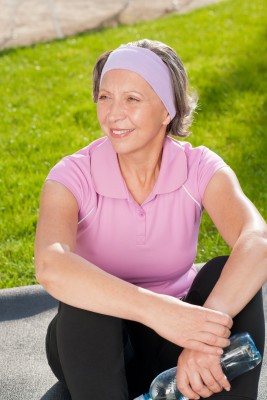
We hear all the time that heat stress (hypothermia) is a serious issue for the elderly. Of course, it’s absolutely true! What we may not be considering is that while most of us do not consider ourselves “elderly” at 55, 65 or even 75, the fact remains that we are more susceptible to the ill effects caused by extreme temperatures than we were even a few years ago. These warnings are not only for our truly elderly parents, they are for us as well!
According to the CDC (Center for Disease Control) “Elderly people (that is, people aged 65 years and older) are more prone to heat stress than younger people”. Here’s why:
- As we age, our bodies do not adapt to changes in temperature as quickly or as easily as they once did. In hot weather our body does not cool us down as quickly as it used to making us more prone to heat exhaustion.
- We are also more likely to have chronic health conditions that further add to our body’s inability to adapt to temperature change.
- We are more likely to be taking prescription medications, many of which can and do alter our body’s ability to adapt to changes in temperature.
RISK FACTORS FOR WOMEN OVER 50
- Being overweight or underweight
- Taking prescription medications such as diuretics, sedatives, tranquilizers and certain heart and blood pressure drugs that may decrease the body’s ability to cool itself through perspiration. (Talk to your doctor or pharmacist about your prescriptions. Find out how they can affect your ability to tolerate heat and/or sun.)
- The normal aging process often results in poor circulation and inefficient sweat glands making it more difficult for the body to cool itself quickly and effectively.
- Alcohol consumption
TAKE PRECAUTIONS
If you have any of the mentioned risk factors, and even if you don’t, take precautions during the summer months to avoid becoming overheated. It is better to be safe than sorry!
Here are some of the things you can do:
- Pay attention to the weather reports. Know when the temperature is going to rise and be prepared.
- Reduce your alcohol and caffeine intake during hot spells.
- Drink cool, non-alcoholic beverages. Avoid extremely cold drinks as they may cause cramps.
- Limit activity.
- Wear cool clothes.
- Remain indoors. If you do not have air-conditioning, consider spending the hottest hours of the day at an indoor mall.
IF YOU BECOME OVERHEATED
- Go to a shady and/or cool place as quickly as possible.
- Cool down rapidly, using whatever means available. Immersion in a cool shower or tub, a cool spray from a garden hose, cool cloth or sponge, and it is even recommended, particularly when the humidity is very low, to wrap the individual in a cool, wet sheet.
- Monitor body temperature with a thermometer if possible. A normal temperature is 98.6.
- Seek medical assistance
SIGNS AND SYMPTOMS OF HEAT STROKE*
Warning signs vary but may include the following:
- An extremely high body temperature (above 103°F)
- Red, hot, and dry skin (no sweating)
- Rapid, strong pulse
- Throbbing headache
- Dizziness
- Nausea
HEAT EXHAUSTION
Heat exhaustion is a milder form of heat-related illness that can develop after several days
of exposure to high temperatures and inadequate or unbalanced replacement of fluids.
Signs and Symptoms of Heat Exhaustion
Warning signs vary but may include the following:
- Heavy sweating
- Paleness
- Muscle Cramps
- Tiredness
- Weakness
- Dizziness
- Headache
- Nausea or vomiting
- Fainting
- Skin: may be cool and moist
- Pulse rate: fast and weak
- Breathing: fast and shallow
*Information provided by the CDC
